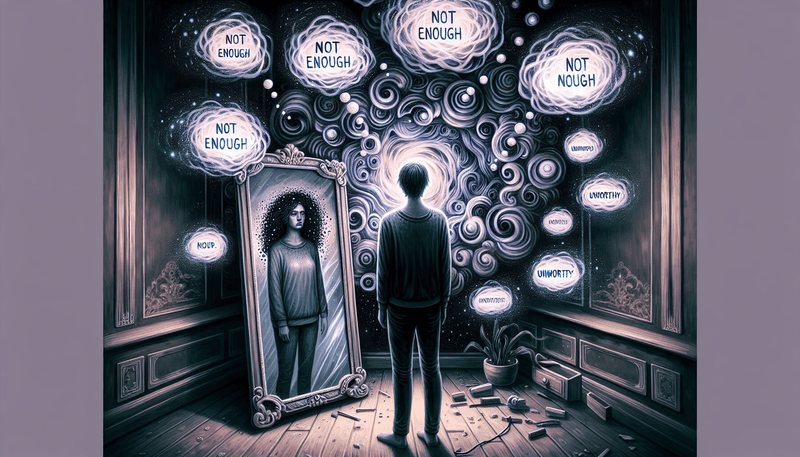15 Things You Probably Still Struggle With If You Grew Up In An Unsafe Family, According To Experts
Growing up in an environment that feels unsafe can have deep and lasting effects on one’s emotional well-being and view of relationships. Those who experienced chaotic, neglectful, or high-conflict childhoods often carry these imprints into adulthood.
This article explores 15 common struggles faced by individuals from such backgrounds, offering insight and understanding into the ongoing challenges they might face. Each item is presented with empathy and clarity, aiming to foster self-awareness and healing.
1. Expecting Rejection

Rejection can feel like an impending storm cloud looming over every interaction. For those familiar with unpredictability, it’s easy to perceive rejection even when it’s absent. This anticipation can shadow friendships and relationships, making every word seem fraught with hidden meaning.
One might walk into a room already braced for the cold shoulder, convinced that acceptance is a fragile, fleeting thing. This mindset can lead to self-fulfilling prophecies, where the fear of rejection creates distance before any bond can form.
Building resilience against this expectation involves recognizing the difference between perceived and actual reactions. Finding spaces where one feels genuinely welcome can slowly rewrite this narrative. Despite the challenge, it’s possible to build connections free from fear.
2. Over-Apologizing

The habit of over-apologizing can be like a reflex, as automatic as breathing. It stems from a desire to maintain peace and avoid conflict, often rooted in a childhood of walking on eggshells. Apologizing becomes a way to preemptively soothe any potential upset, even in situations where no apology is needed.
This behavior can be exhausting, turning interactions into a minefield of perceived missteps. Others might see the constant apologies as unwarranted, leading to confusion or even frustration.
Breaking free from this cycle involves recognizing one’s worth and the right to occupy space without apology. It can be liberating to realize that not every situation demands contrition, allowing for more authentic and balanced interactions.
3. Struggling to Feel Safe

Feeling unsafe can be a lingering shadow in even the most nurturing of relationships. Memories of chaos can transform warmth into suspicion, with love feeling like a mirage ready to dissolve. Trust becomes a fragile thing, easily shattered by minor misunderstandings.
This struggle can lead to a constant state of alertness, where vulnerability feels like an insurmountable risk. Emotional closeness may be perceived as a potential threat rather than a source of comfort.
Cultivating a sense of safety involves gradual steps towards trusting others, knowing that not every relationship mirrors past experiences. This journey can be daunting but slowly rebuilding trust can pave the way for genuine intimacy.
4. Minimizing Needs

Minimizing one’s needs can become second nature for those attuned to conflict. Expressing wants might have felt dangerous, so they’d shrink themselves to maintain peace. Needs become whispers easily drowned out by louder demands.
In adulthood, this can manifest as neglecting self-care or hesitating to voice preferences, leading to unfulfilled lives. The fear of being perceived as difficult or demanding often outweighs the necessity to advocate for oneself.
Reclaiming the right to express needs requires practice and patience. Embracing the idea that one’s desires matter is crucial. By valuing personal needs, individuals can create more balanced relationships, where both parties’ voices are heard equally.
5. Confusing Intensity with Connection

Intensity can masquerade as connection, particularly for those accustomed to tumultuous environments. The rush of adrenaline, the heightened emotions, can be mistaken for depth and intimacy.
In reality, true connection is often quieter and more stable, not reliant on the peaks and troughs of emotional upheaval. This confusion can lead to a cycle of dramatic relationships, where calmness is mistaken for lack of passion.
Understanding this distinction is key to building healthier connections. Acknowledging that steady, gentle interactions offer more sustainable satisfaction can lead to more meaningful relationships. It’s a lesson in appreciating the peaceful moments rather than seeking constant emotional drama.
6. Distrust of Compliments

Compliments can feel like hidden traps for those who’ve grown up in critical environments. Accustomed to criticism, praise might seem insincere or manipulative, leading to skepticism.
This doubt can overshadow genuine appreciation, turning a simple compliment into a source of anxiety rather than delight. The struggle to trust positive feedback often stems from a belief that it’s undeserved or conditional.
Learning to accept compliments involves recognizing them as genuine expressions rather than veiled criticisms. It requires a shift in perspective to see oneself as worthy of praise, allowing compliments to be received with grace and gratitude.
7. Questioning Self-Worth

Quiet moments can be filled with an insidious doubt for those who question their self-worth. In the silence, a chorus of internalized criticisms might resurface, casting shadows over any achievements.
This lingering doubt can erode self-esteem, making personal accomplishments feel like impostures awaiting exposure. Self-worth becomes a battleground where perceived failures overshadow genuine successes.
Building a stronger sense of self requires actively challenging these negative thoughts. By celebrating small victories and embracing imperfections, individuals can begin to nurture a healthier self-esteem, transforming quiet moments into opportunities for reflection and growth.
8. Assuming Strings Attached

Affection can feel conditional when one is used to strings attached to every gesture. Gifts, praise, or kindness might seem like currency exchanged for future favors, rather than genuine acts of care.
This assumption can turn generosity into a source of stress, where every act of kindness is scrutinized for ulterior motives. Relationships might feel transactional, with suspicion overshadowing genuine connections.
Challenging this belief involves recognizing that affection can be freely given, without expectations. By trusting in the sincerity of others, it’s possible to enjoy the warmth of unselfish kindness and build more authentic, trusting bonds.
9. Fear of Abandonment

The fear of abandonment can be a relentless undercurrent, coloring every relationship with anxiety. It’s a shadow that looms over even the most secure connections, whispering doubts about their permanence.
This fear can lead to clinginess or self-sabotage, creating a self-fulfilling prophecy where the fear of loss becomes the catalyst for its realization. Relationships are constantly tested, as if proving their durability will ward off the dreaded departure.
Overcoming this fear requires building trust in oneself and others. By nurturing a sense of self-worth and security, individuals can learn to embrace relationships without the weight of constant dread, fostering deeper connections.
10. Sabotaging Good Things

The sabotage of good things can be paradoxically comforting for those used to chaos. Stability might feel unsettling, as if it’s a lull before an inevitable storm.
This mindset can lead to deliberate disruptions in life, where achievements are dismantled to recreate familiar turmoil. Success becomes a fragile thing, quickly undone by a subconscious pull towards disorder.
Recognizing this pattern is the first step in breaking it. By embracing stability and allowing oneself to thrive, it’s possible to build a life where success isn’t feared but celebrated. This process involves trusting that good things can persist without the threat of impending disaster.
11. Tolerating Bad Behavior

Tolerating bad behavior can feel normal for those who’ve endured it in the past. When chaos is familiar, it can be mistaken for normalcy, leading to prolonged patience in unhealthy situations.
This tolerance might manifest as enduring toxic relationships or accepting disrespect, under the guise of resilience. It becomes difficult to draw lines and establish boundaries, fearing that standing up might lead to greater conflict.
Learning to identify and reject unacceptable behavior involves redefining what one considers worthy of tolerance. By prioritizing self-respect and drawing clear boundaries, it’s possible to foster healthier dynamics and leave behind the acceptance of negativity.
12. Difficulty Regulating Emotions

Emotion regulation can feel like a daunting task for those who never learned to manage their feelings in chaos. Emotions might swing wildly, with anger or sadness erupting unexpectedly.
This lack of control can strain relationships and hinder personal growth, turning everyday challenges into triggering events. Emotions become a tempest, unpredictable and intense.
Developing emotional regulation skills involves recognizing triggers and understanding emotional responses. Techniques such as mindfulness and therapy can help in calming these emotional storms, leading to more measured reactions and greater personal harmony.
13. Over-sharing or Silence

The balance between sharing and silence can be elusive for those from chaotic backgrounds. Over-sharing might feel like an attempt to connect deeply, while silence becomes a shield against vulnerability.
Inconsistent communication patterns can confuse others, making it difficult to build consistent relationships. Finding the right balance requires understanding when and how much to share.
Cultivating communication skills is crucial for forming meaningful connections. By learning to gauge social cues and establish boundaries, individuals can navigate interactions more effectively, creating spaces where sharing feels both safe and appropriate.
14. Craving Control

Control can be a comforting illusion for those who grew up amidst unpredictability. It provides a semblance of order in a world that once felt chaotic and out of control.
This craving might manifest as perfectionism or an inability to delegate, where letting go of control feels tantamount to inviting chaos. It can stifle creativity and strain relationships, turning flexibility into a source of anxiety.
Embracing uncertainty involves gradually relinquishing control and trusting in one’s ability to adapt. By accepting that not everything can be managed, it’s possible to find peace amidst chaos, fostering resilience and growth.
15. Downplaying Trauma

Downplaying trauma can become a defense mechanism for those who feel their pain is lesser than others. In a world that often quantifies suffering, it’s easy to dismiss one’s experiences as insignificant.
This minimization can prevent healing, trapping individuals in a cycle of unaddressed emotions and unresolved trauma. By comparing pain, the attention needed for personal recovery is diverted.
Acknowledging trauma without comparison is vital for healing. Each story holds its significance, and recognizing this allows for deeper self-compassion and recovery. By embracing one’s narrative, the journey towards healing becomes authentic and empowering.







